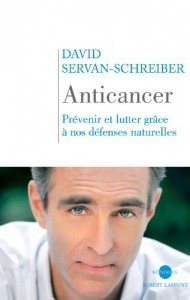Color Me Dubious

Color me dubious. The further I read into this book, the more skeptical I became--which is a shame, because Dr Servan-Schreiber with his unique perch as physician, research scientist and cancer patient would, I thought, be the perfect person to sift the solid science from wishful thinking and outright quackery but...
This book is rated as high as it is because nothing in his proposed program could do harm (the mindset being a different story) and I couldn't help being fascinated by parts and moved by others. Servan-Schreiber with his background as a research scientist was lucid and engaging in describing cancer's mechanisms and cancer research. I loved reading about "mighty mouse"--the mouse seemingly immune to cancer. I had to agree after reading those early chapters that "cancer is a fascinating and perverse phenomenon." And I couldn't help but be moved and inspired by many of the stories--not just his own but that of naturalist Stephen Jay Gould who against the odds beat his own cancer, and Jacqueline, a cancer patient who found reserves of strength in practicing karate with fellow cancer patients.
How could I not be moved? I was diagnosed with Stage Three Breast cancer in September of last year. In the preceding months I've undergone months of chemotherapy, a mastectomy, radiation treatments and will continue getting infusions of Herceptin until this October. And I've met far too many cancer patients who are on their second or third round with cancer. I don't want to go through all this again--thus the appeal of the promise of the title. I could certainly identify with and understand so much the people in these pages went through--and I get the fierce hope that you could take your destiny in your own hands--that you can beat back your body's betrayal. Feeling in control is so very important to you. I get that. But there's a flip side to that which isn't so positive. I've encountered people certainly who believe the patient should be blamed for their cancer. In a review of mine critical of one health guru I was told straight out that I should listen to this author--that it was my lifestyle that had made me sick. I believe Servan-Schreiber plays into this with his insistence on the "mind/body connection"--this idea, or at least implication--that if you succumb you had not just the wrong lifestyle but the wrong attitude. Ironically Servan-Schreiber's own careful tending of his "terrain" did not stop him from dying of cancer some years ago. Humans are mortal--that's not under our control and sometimes when it comes to cancer we lose--and it's not our fault.
And there's another problem with this kind of view--that cancer is under our control and would be prevented if only the medical and pharmaceutical establishment would acknowledge the truth. To Servan-Schreiber's credit he emphasizes the importance of conventional therapy, and emphasizes his prescriptions are meant to be complimentary, not alternatives. In the book Herceptin, one of the drugs I'm taking, is described as "a revolutionary drug qualified in 2005 as a 'major turning point in the eradication of suffering and death from cancer.'" I'm expected to survive this--and for that I credit the achievements of those lambasted pillars of the medical and pharmaceutical establishment. But in these past months I've met more than one cancer patient who have refused not just (admittedly scary and debilitating) chemotherapy but the relatively low-risk/high benefit radiation and hormone treatments. Who have told me that people like my oncologist are shills for the pharmaceutical companies and "don't you know what they give you in chemo is poison?" I do know--that's the point--it poisons the cancer. Yes, it poisons the patient as well--but we have the better chance of bouncing back.
So I worry books like these contribute to the paranoia, the distrust of life-saving medicines. All the more because in the end Servan-Schreiber struck me as ultimately far too credulous--there seemed to be no cause of cancer ever put out there from cell phones to deodorants to Teflon pans he wouldn't credit--ditto any purported alternate therapies down to that of shamans and Tibetan monks. Servan-Schreiber takes seriously T. Colin Campbell, a doctrinaire vegetarian and author of the <i>China Study</i>--a controversial figure but Servan-Schrieber skips the controversy. I just never got the sense in this book that evidence on the other side was considered beyond the quick dismissing of straw men. Some of what he cautions against might cause cancer, some be protective--my point is in the end I felt no confidence he could help me sort out which.
However, as I wrote above, at least the prescriptions themselves would do little harm--except maybe to your wallet--organic food and cosmetics, water filters... Much of the advice is what any doctor would tell you--avoid processed foods, consume plenty of veggies, fruit, tea, fish rich in Omega-3, get plenty of sunshine and exercise. No, the seductive dangers of the book are more subtle than that.
 3
3
 5
5








